Dolphin Control and Pump Room: Difference between revisions
Pbcjohnston (talk | contribs) Added photos |
Pbcjohnston (talk | contribs) Added photos |
||
| Line 56: | Line 56: | ||
[[File:Red bar sub new 2.jpg]] | [[File:Red bar sub new 2.jpg]] | ||
[[File:Dolphin X-masstree.jpg|left|500px]] | |||
<div style="text-align: justify;"><span style="color:#00008B">Close up of the aft of two Christmas Trees. Another is seen on the forward bulkhead of the control room. | |||
<small>US Navy Photo Contributed by Roger Torgeson</small> | |||
[[File:Red bar sub new 2.jpg]] | |||
[[File:Dolphin Control aft-1d.jpg|left|500px]] | |||
<div style="text-align: justify;"><span style="color:#00008B">Stern planes control wheel on the left, bow planes wheel on the right. Two shallow water depth gauges with the deep water gauge in the center. Horizontal bubble clinometer gauges for angle. Rudder angle indicator is probably for the Diving Officer to keep in the loop. | |||
The large, angled sheet metal enclosures, to the left and right of the stern planes and bow planes wheels, cover the mechanical linkages for the stern and bow planes control rods. | |||
<small>US Navy Photo Contributed by Roger Torgeson</small> | |||
[[File:Red bar sub new 2.jpg]] | |||
[[File:Dolphin Control aft-1e.jpg|left|500px]] | |||
<div style="text-align: justify;"><span style="color:#00008B">Closeup of the angle clinometers than indicate whether the boat has an up or down angle, and how much. There is also an indicator for the angle position of the bow and stern planes. The circular gauge in the center is a rudder angle indicator. How much rudder is on will affect the up or down angle of the boat. Large amounts of rudder tend to make the stern squat downward. | |||
<small>US Navy Photo Contributed by Roger Torgeson</small> | |||
[[File:Red bar sub new 2.jpg]] | |||
[[File:Dolphin Control aft-1f.jpg|left|500px]] | |||
<div style="text-align: justify;"><span style="color:#00008B">A closeup of the depth gauges. The two large ones are shallow water gauges, which go to only 150 feet. The smaller one in the center is the deep water gauge, calibrated to what appears to be 400 feet. Depth is measured to the keel. | |||
<small>US Navy Photo Contributed by Roger Torgeson</small> | |||
[[File:Red bar sub new 2.jpg]] | |||
<center> | <center> | ||
Page created by:<br> | Page created by:<br> | ||
Revision as of 17:21, 15 June 2023
Control Room

In the center above the helm wheel is the rudder angle indicator, flanked on both sides by the engine order telegraphs. The lever on the vertical shaft was used to engage/disengage the control room helm from the conning tower and bridge helm. Which helm would have been the primary station for submerged operations? We would lean towards the conning tower, but that opinion might be flavored by what was done in combat in WWII and may not necessarily reflect pre-war 1930's practice.
Large levers next to helm are for switching from normal hydraulic to hand hydraulic. In hand hydraulic you spun the wheel to develop hydraulic pressure and this was a very laborious process.
Oval hatch in deck next to helm most likely leads to a store room. Note speaking tube to conning tower above the helm.
US Navy Photo Contributed by Roger Torgeson

Open grate in the deck leads most likely to the Pump Room and the grating is for drainage of any flooding into the Pump Room, where it can be pumped out through the main drainage system.
The square hatch is suspected to be the access to the Cold Room/Freezer. The padlock seen on the hatch seems to correspond to other food storage areas with padlocks making us think this is that space. Drawings indicate that the Cold Room/Freezer was directly under the middle of the Control Room.
On the right edge of the photo, just below the polished bell of the speaking tube, and above the battle lantern, is the mechanical linkage for the bow planes coming out of the angled enclosure just above and to the right of the bow planes control wheel.
US Navy Photo Contributed by Roger Torgeson

US Navy Photo Contributed by Roger Torgeson

US Navy Photo Contributed by Roger Torgeson
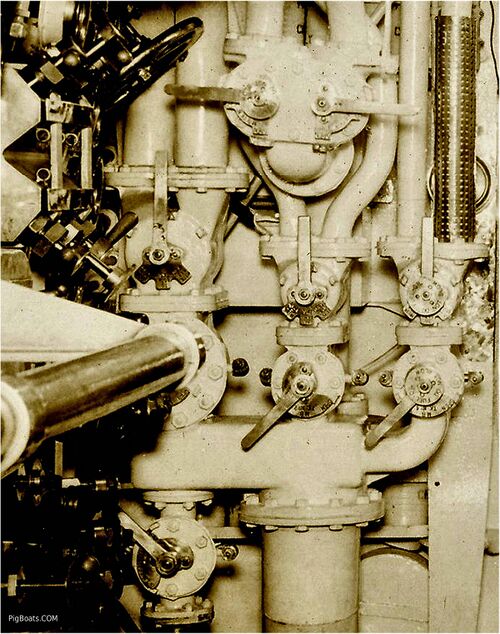
US Navy Photo Contributed by Roger Torgeson

US Navy Photo Contributed by Roger Torgeson
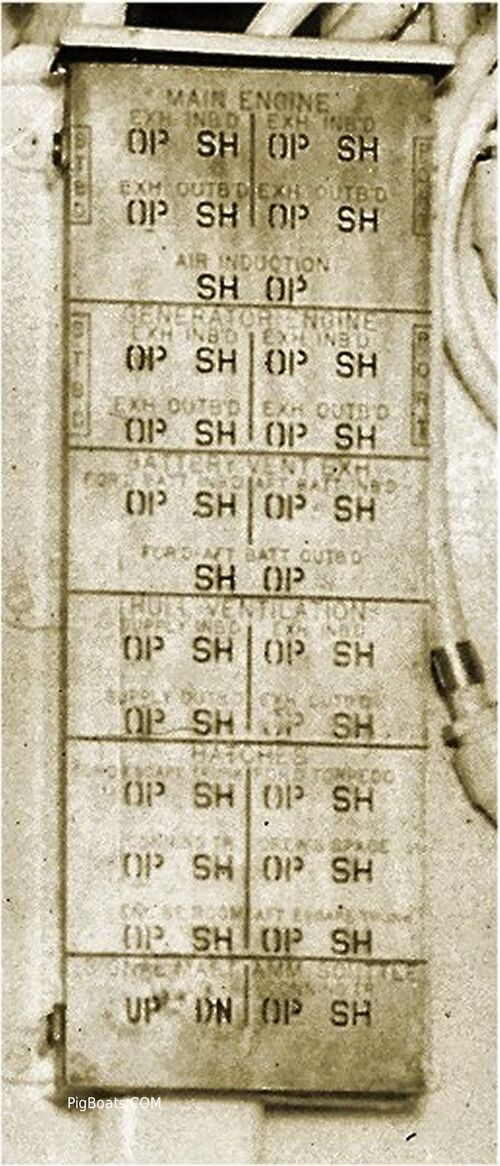
US Navy Photo Contributed by Roger Torgeson
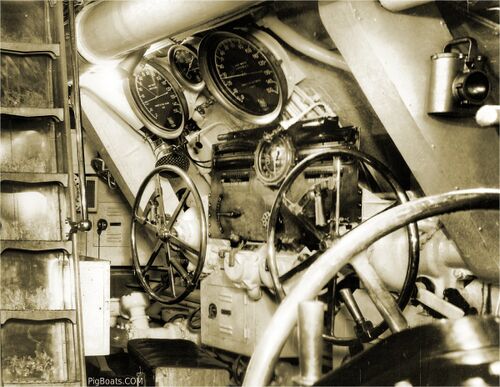
The large, angled sheet metal enclosures, to the left and right of the stern planes and bow planes wheels, cover the mechanical linkages for the stern and bow planes control rods.
US Navy Photo Contributed by Roger Torgeson
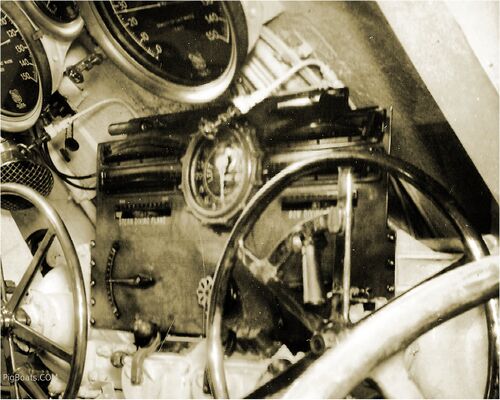
US Navy Photo Contributed by Roger Torgeson
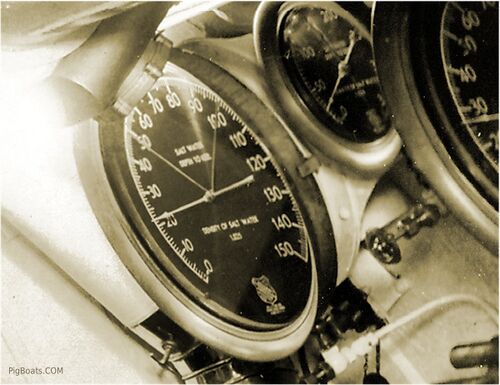
US Navy Photo Contributed by Roger Torgeson
Page created by:
Ric Hedman & David Johnston
1999 - 2023 - PigBoats.COM©
Mountlake Terrace, WA, Norfolk, VA
webmaster at pigboats dot com
